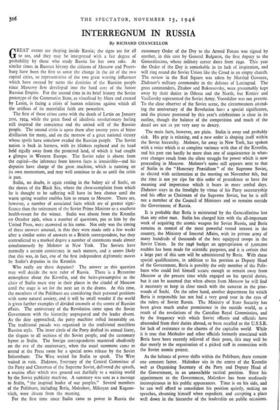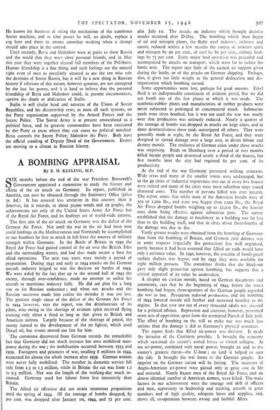INTERREGNUM IN RUSSIA
By RICHARD CHANCELLOR
GREAT events are shaping inside Russia; the signs are for all to see, and they may be interpreted with a fair degree of probability by those who study Russia for her own sake. At similar times in Russian history the citizens of Moscow and Peters- burg have been the first to sense the change in the air of the two capital cities, so representative of the two great warring influences which have swayed by turns the destinies of the Russian people since Muscovy first developed into the hard core of the future Russian Empire. For the second time in its brief history the Soviet prototype of the Communist State, as visualised by Marx and created by Lenin, is facing a crisis of human relations against which all the artifices of its materialist faith are powerless.
The first of these crises came with the death of Lenin on January
21st, 1924, while the great flood of idealistic revolutionary feeling still inspired the conscience and the united will of the Russian people. The second crisis is upon them after twenty years of bitter disillusion for many, and on the morrow of a great national victory whose spoils have somehow evaded the Russian people. The Soviet nation is back in harness, with its blinkers replaced and its head held rigidly away from the promised land, of which it had caught a glimpse in Western Europe. The Soviet ruler is absent from the capital—the inference from known facts is irresistible—and his deputies have charge of the great machine, which is running on its own momentum, and may well continue to do so until the crisis is past.
Stalin, no doubt, is again resting in the balmy air of Sochi, on the shores of the Black Sea, where the chest-complaint from which he is thought to be suffering will have its best chance until the warm spring weather enables him to return to Moscow. There are, however, a number of associated facts which are of greater signi- ficance than the retirement of the Soviet Prime Minister to a southern health-resort for the winter. Stalin was absent from the Kremlin on October 29th, when a number of questions, put to him by the United Press, were answered in his name. Not only was the timing of these answers unusual, in that they were made only a few weeks after a similar series of answers to a British correspondent, but they contradicted to a marked degree a number of statements made almost simultaneously by Molotov in New York. The Soviets have normally a certain consistency in such matters, and it seems likely that this was, in fact, one of the first independent diplomatic moves by Stalin's deputies in the Kremlin.
Who really are these deputies? The answer to this question may well decide the next ruler of Russia. There is a Byzantine atmosphere about the Kremlin, and the heirs-presumptive to the chair of Stalin must stay in their places in the citadel of Moscow until the stage is set for the next act in the drama. At this time, the members of the Politburo are considering their personal positions with some natural anxiety, and it will be small wonder if the world is given further examples of divided counsels at the centre of Russian affairs. The anniversary of the Revolution came upon the Soviet Government with the hierarchy unprepared and the leader absent. As the date approached, the party machine rolled inexorably on. The traditional parade was organised in the traditional matchless Russian style. The inner circle of the Party drafted its annual litany, the slogans to all sections of the Soviet people, and the customary hymn to Stalin. The foreign correspondents mustered obediently on the eve of the anniversary, when the usual summons came to attend at the Press room for a special news release by the Soviet Informburo. The West waited for Stalin to speak. The West waited in vain. Zhdanov, Secretary of the Central Committee of the Party and Chairman of the Supreme Soviet, delivered the speech, a routine affair which was ground out dutifully to a waiting world by the Soviet publicity machine. A summary was sent as a message to Stalin, " the inspired leader of our peoples." Several members of the Politburo, including Beria, Malenkov, Mikoyan and Kagano- vitch, were absent from the meeting.
For the first time since Stalin came to power in Russia the customary Order of the Day to the Armed Forces was signed by another, in this case by General Bulganin, the first deputy to the Generalissimo, whose military career dates from 1940. This year the Order of the Day is remarkable in its lack of inspiration, and will ring round the Soviet Union like the Creed in an empty church. The review in the Red Square was taken by Marshal Govorov, Zhdanov's military commander in the defence of Leningrad. The great commanders, Zhukov and Rokossovsky, were presumably kept away by their duties in Odessa and the North, but Koniev and Vasilievsky represented the Soviet Army. Voroshilov was not present. To the close observer of the Soviet scene, the circumstances attend- ing the anniversary of the Revolution have a special significance, and the picture presented by this year's celebrations is clear in its outline, though the balance of the composition and much of the detail are not as yet very easy to descry.
The main facts, however, are plain. Stalin is away and probably sick. His grip is relaxing, and a new order is shaping itself within the Soviet hierarchy. Molotov, far away in New York, has spoken with a voice which is at complete variance with that of the Kremlin, and his part can hardly be more than one of acquiescence in what- ever changes result from the silent struggle for power which is now proceeding in Moscow. Molotov's name still appears next to that of Stalin in the "Honorary Prmsidium " of the Supreme Soviet, as elected with acclamation at the meeting on November 6th, but the time is not yet ripe for this order of precedence to have the meaning and importance which it bears in more settled days. Zhdanov stays in the limelight by virtue of his Party secretaryship and his office as Chairman of the Supreme Soviet, but he is still not a member of the Council of Ministers and so remains outside the Government of Russia.
It is probable that Beria is mistrusted by the Generalissimo less than any other man. Stalin has charged him with the all-important work of acquiring the atomic weapon for Soviet Russia, and Beria remains in control of the most powerful vested interest in the country, the Ministry of Internal Affairs, with its private army of many hundreds of thousands of the best equipped troops in the Soviet Union. In the 1946 budget an appropriation of 5,000,000 roubles has been made for scientific purposes, and it is certain that a large part of this sum will be administered by Beria. With these special qualifications, in addition to his position as Deputy Head of the Government, Beria is possibly the only member of the Polit- buro who could feel himself secure enough to remain away from Moscow at the present time while engaged on his special duties, but it can be assumed that when absent from Moscow he will find it necessary to keep in close touch with the autocrat in the pine- woods of Sochi. On the other hand, another department for which Beria is responsible has not had a very good year in the eyes of the rulers of Soviet Russia. The Ministry of State Security has been given much undue prominence in the outside world, as a result of the revelations of the Canadian Royal Commission, and by the frequency with which Soviet officers and officials have absconded from their duties abroad, or been recalled to the U.S.S.R. for lack of resistance to the charms of the capitalist world. While it is true that Merkulov and other officials formerly associated with Beria have been recently relieved of their posts, this may well be due merely to the organisation of a picked staff in connection with the Soviet atomic project.
As the balance of power shifts within the Politburo, there remains one constant factor. Malenkov sits in the centre of the Kremlin web as Organising Secretary of the Part) and Deputy Head of the Government, in an unassailable tactical position. Since his appointment to the Government, Malenkov has been studiously inconspicuous in his public appearances. Time is on his side, and he can well afford to consolidate his position quietly, making no speeches, absenting himself when expedient, and accepting a place well down in the hierarchy of the leadership on public occasions.
He knows his business of oiling the mechanism of the cumbrous Soviet machine, and as time passes he will, no doubt, replace a cog here and there to ensure smoother working when a change should take place in the control.
Until recently, Beria and Malenkov were at pains to show Russia and the world that they were close personal friends, and in May this year they were together elected full members of the Politburo. Human friendship is a fine thing, and such feelings are the natural right even of men as peculiarly situated as are the ten who rule the destinies of Soviet Russia, but it will be a new thing in Russian history if relations of this nature, however genuine, are not corrupted by the lust for power, and it is hard to believe that the personal friendship of Beria and Malenkov could, in present circumstances, survive the death or abdication of Stalin.
Stalin is still titular head and autocrat of the Union of Soviet Republics, and his dictatorship rests, as must all such systems, on the Party organisation supported by the Armed Forces and the Secret Police. The Soviet Army is at present emasculated as a political force, and its greatest commanders have been rusticated by the Party to areas where they can cause no political mischief. Beria controls the Secret Police; Malenkov the Party. Both have the official standing of Deputy Head of the Government. Events are moving to a climax in Russian history.



































 Previous page
Previous page